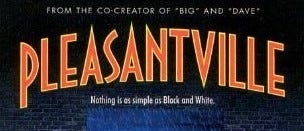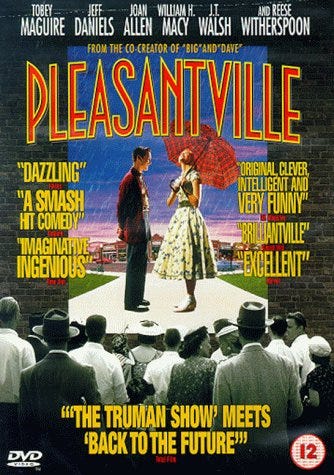(Contains light spoilers)
Pleasantville (1998) – Feminist
Keeping our reviews in the hyper-specific category of 1998 meta-media named for a fictional show within the film and examining the lives of those we think we understand because we witness them day in and day out in 24-hour instalments, this week’s film is one of my all-time favourites: Gary Ross’s Pleasantville (1998). From a standard California-esque high school to a town created purely from our most nostalgic constructions of the 1950s with unrealistic expectations of submissiveness to social conservatism, our main characters David and Jennifer (Tobey Maguire and Reese Witherspoon) are transformed into Pleasantville’s own Bud and Mary Sue by Don Knotts pretty much playing himself. As the two begin to interact with the town – David as an admirer and long-time fan of the show and its values and Jennifer as a rebellious bad girl disgusted with the idea of playing in poodle skirts – their 1990s freedoms, ideas, and attitudes begin to influence the town and its people in striking, vibrant ways. This week, we’re venturing into our first ideological approach by looking at the film through a feminist lens.
As with every one of these, there are many angles to approach from and I am going to bypass the most obvious analysis of the portrayal of the 1950s housewife and her subsequent liberation from the repressive misogyny of her husband. Bud and Mary Sue’s mother, Betty (Joan Allen) is far more interesting as a fully developed character than she is in relation to her husband (who is played so excellently by William H. Macy). While she certainly does experience this liberation as a housewife intellectually, temporally, and physically by removing herself from the home, I want to home in on Betty’s personal growth and complexities irrespective of her marital status.
Betty masturbates. Not only does Betty masturbate, but she also does so in a bathtub with a shower head and has an orgasm so strong she sparks the town’s first-ever fire, burning the tree in her front yard with bright orange flames against the town’s standard black and white backdrop. I love this for Betty.
(Just as an aside: these people all have genitals but there are no toilets in Pleasantville, so they’re just there. You’d think they’d be smooth as Ken dolls, but from the rockin’ at Lover’s Lane, we can safely assume otherwise.)
Betty’s orgasm is an exercise in curiosity, intimacy with herself, and a bravery to explore her own pleasure in such a repressive, socially conservative life and town. She had it in her all along to be curious and to want more, to want to feel more, and there is nothing in the film to suggest David and Jennifer’s presence did anything but prompt and encourage opportunity for her to explore these things already within herself. Betty takes her investigations of her body and mind and wants and needs and desires seriously and, crucially, unapologetically. She is easily the strongest character in the film and speaks to a sexual liberation that even Jennifer, the self-proclaimed “slut”, never does. While this is still very much a 90s neo-liberal-at-best commentary on the appropriate ways in which to have a robust sex life, the portrayal of Betty’s sexual freedom as superior to Jennifer’s is at least rooted in her deep introspection on what she wants, how she wants it, and in what ways she can give it to herself, and that is far, far more interesting than her marital position in relation to any man in the film. It is very rare to have a film depict such an excellent role model for how to have a deeply personal and fulfilling relationship with your own sexual proclivities and needs, and I think Betty has a perfect arc in finding herself under the makeup and clothing and conservative expectations of her as a housewife, allowing her to truly emerge as a fully realised woman in her own right.
For a subsequent reading of the film from a feminist perspective, let’s look at the blame placed on the two teenage girls by not only David but also the framing of the film. We see things begin to change in the town after Jennifer/Mary Sue’s sexual influences and we are led to assume that she is the catalyst for the changes due to her “immoral” behaviour. However, David/Bud is just as complicit in encouraging change and even accelerates the developments when a girl, Margaret (Marley Shelton), begins to take an interest in him. When Margaret bakes him cookies, David insists that her interest is unwarranted and rather belongs to another character in the fictional show, but when she asserts that she can make up her own mind and decide what she wants for herself, David begins to drastically transform the town at a much faster rate than Jennifer had with books and art and progressive ideas. Each evolution of David’s influence is pre-empted by an interaction of his with Margaret, suggesting that she is rather the catalyst here.
This framing of both Jennifer’s sexual immorality as a more impactful influence and Margaret’s assertion of her own romantic interests prompting David’s influences creates a veneer of young women with agency in a social revolution. But, it also created a complex dynamic of repression by empowerment where the audience is meant to place the blame for the changes – initially perceived as alarming and bad – on Jennifer for her sexual impropriety, and later when the town becomes violently polarised while dealing with these abrupt deviations from their pleasant norm, blame is structurally placed on Margaret while David emerges as the singular hero, fixing the problems caused in some part by the women in the film.
Betty’s climaxes, Jennifer’s body, and Margaret’s cookies offer insights into the gender dynamics of the film, particularly the ways in which women are portrayed as agential but also disruptive in ways that still require a man’s influence to fix the problems resultant from their self-assertions. By liberating these women from the repressive social conservatism of Pleasantville and subsequently allowing them to be self-expressive, self-intimate characters, the film suggests a progressive, sexually liberated, feminist surface. However, by choosing to so subtly frame those self-expressions and sexually open moments of assertive desire as catalysts of fires, presumed diseases, and extreme violence that can only be resolves by the yelling of men, Pleasantville fails to fully commit to the feminist agenda it boasts.
Because I’m Never Done When I Say I Am
Contemporary History
Pleasantville very much engages with the 1998 moment in which it was made. Through direct scenes of David and Jennifer’s high school experiences, MTV, damningly prescient political commentaries and climate predictions, chokers, cropped tees, and low-rise jeans, the film sets up a very sharp contrast between the late 1990s and the late 1950s. Further, however, despite these highlighted hardships of 1998, the movie still imports 1998 perspectives and politics into the fictional 1958 world within the filmic world, and it deems those views more progressive, more liberating, and more worthy as life-changing emotional endeavours to pursue. I cannot think of a more perfect encapsulation of a late 1990s neo-liberal attitude than harshly critiquing one’s own moment while also proclaiming it superior to those that came before.




